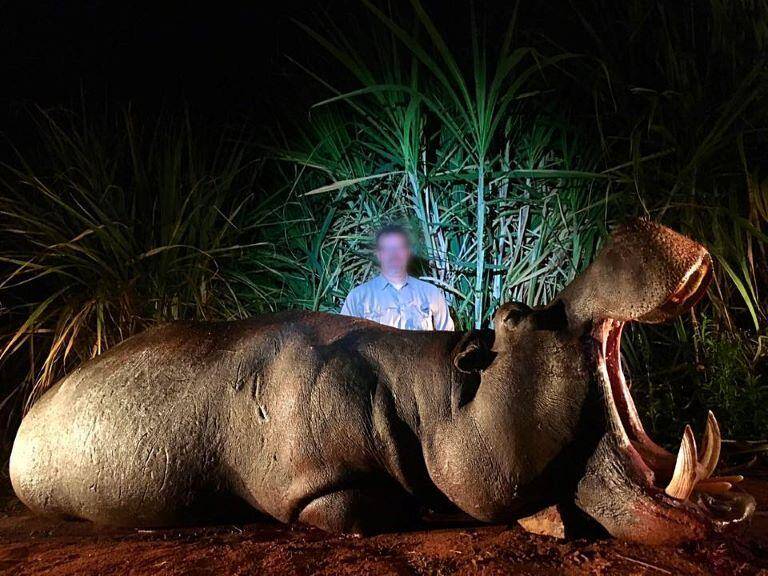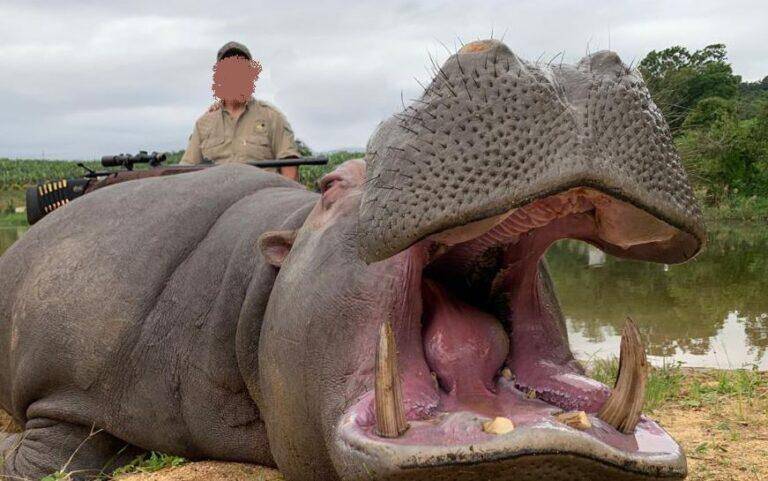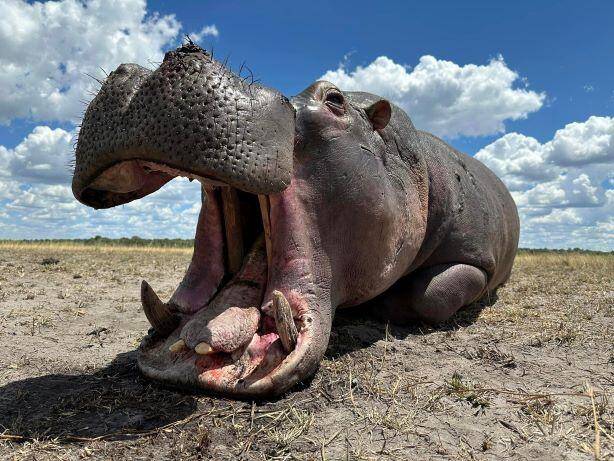The hippopotamus, one of Africa’s most formidable creatures, is rarely seen as prey due to its immense size and strength. Weighing up to 4,000 pounds and equipped with powerful jaws, it’s no wonder hippos are considered almost untouchable in the animal kingdom. However, even these giants aren’t entirely free from danger.
Predators that dare to hunt a hippo must possess exceptional strength, strategy, and coordination. Understanding which animals take on this challenge offers a fascinating glimpse into the dynamics of Africa’s wildlife. From apex predators to opportunistic hunters, the natural world is full of surprises.
[DYNAMIC-BLOGTABLEOFCONTENT]
Key Takeaways
-
Hippos face few natural predators due to their size and strength, but young or injured individuals can be vulnerable to attacks.
-
Lions, as apex predators, occasionally hunt hippos, relying on teamwork, timing, and ambush strategies, especially during times of prey scarcity.
-
Nile crocodiles mainly target hippo calves, using stealth and aquatic ambush tactics, but avoid adult hippos due to the high risk involved.
-
Humans have historically hunted hippos for cultural and economic reasons; today, regulated hunting supports conservation and local economies.
-
Hyenas rarely attempt to hunt hippos but often scavenge on carcasses, playing a critical ecosystem role in minimizing waste.
-
Environmental factors, such as habitat conditions and water availability, significantly influence predator-hippo interactions and survival risks.
Understanding The Hippo’s Predators
Hippos face limited predatory threats due to their immense size and aggressive nature. However, specific predators in Africa rely on strategy and coordinated hunting to target these formidable animals, typically focusing on younger or weaker individuals.
Lions as Opportunistic Predators
Lions have occasionally targeted hippos, often forming large coalitions to hunt. This typically happens during periods when food sources are scarce. Young or injured hippos grazing near water are the most common targets, as they lack the defensive capabilities of adults. In “hippo hunts,” lions use their endurance and teamwork to their advantage.
Crocodiles in Aquatic Hunting
Nile crocodiles, while generally wary of adult hippos, pose a threat to calves. They utilize stealth while submerged in rivers or lakes to ambush their prey. Crocodiles rarely engage robust adults, as the risk outweighs the reward. These attacks often occur in bodies of water where both species coexist.
Humans and Hippo Hunting
Humans have historically hunted hippos for various reasons, including their meat and ivory-like teeth. Modern “hippo hunting” across Africa is more controlled and often regulated as part of game hunting packages. These practices support conservation funding while allowing regulated levels of hunting. Though controversial, regulated hunting plays a dual role in managing species populations and generating economic benefits through tourism.
Understanding the dynamics between hippos and their predators highlights nature’s complex and often brutal survival mechanisms.

Crocodiles: Opportunistic Hunters
Crocodiles rank among the most opportunistic predators in Africa, adapting their hunting techniques to their surroundings and available prey. When targeting hippos, they rely on stealth and patience, particularly in aquatic environments.
How Crocodiles Attempt To Hunt Hippos
Crocodiles approach hippo hunting with strategic ambushes, primarily targeting calves swimming near the edges of pods. Using their powerful tails and jaws, they launch swift attacks in water, aiming to grab and drag smaller hippos into deeper areas. Their camouflage helps them stay unnoticed in murky rivers, giving them an edge during hunts. Given the size and aggression of adult hippos, crocodiles rarely attempt direct confrontations unless they spot vulnerabilities such as separated or injured individuals.
Examples of hunting attempts often display coordinated effort during opportunistic moments, such as when hippos cross crocodile-dense waters or venture into restricted channels.
Limitations Of Crocodiles Against Adult Hippos
Crocodiles face significant challenges when hunting adult hippos. A full-grown hippo’s size, about 4,000 pounds, and immense strength make it nearly invulnerable. Crocodiles risk severe injuries as defensive bites from a hippo can crush bones. Additionally, hippos often travel in groups, deterring predators through collective protection strategies like encircling calves or charging aggressors.
These limitations compel crocodiles to prioritize smaller prey or rare ambush opportunities involving isolated or weakened targets over actively challenging adults. Given this dynamic, crocodile predation on hippos remains minimal compared to other African wildlife interactions.

Lions: The King Of Predators
Lions are one of the few predators capable of taking on a hippopotamus despite its massive size and strength. Known for both their hunting prowess and coordinated strategies, lions often target vulnerable hippos under specific circumstances.
Strategies Lions Use To Prey On Hippos
Lions rely on teamwork, timing, and coordination to hunt hippos effectively. They typically hunt in coalitions, with larger groups increasing their success rate in taking down larger prey. Hippo hunts usually occur at night when hippos leave the water to graze. This nocturnal timing provides an advantage by reducing visibility and exploiting the hippo’s limited mobility on land.
Young or weakened hippos are the most common targets due to their relative lack of defense. When pursuing a hippo, lions use ambush tactics, positioning themselves near paths where hippos regularly travel. After striking the first blow, they rely on relentless attacks to weaken and subdue their prey.
Risks Involved In Hunting A Hippo
Hunting a hippo is a dangerous venture even for lions. Adult hippos are capable of inflicting severe injuries using their powerful jaws and tusk-like teeth. A single miscalculation can lead to fatal outcomes for an attacking lion. Their immense size, with some weighing up to 4,000 pounds, makes it almost impossible for a single lion to overpower a full-grown hippo.
In situations where food sources are abundant, lions often avoid hippo hunting altogether due to the risks involved. However, during times of scarcity, the reward can outweigh the danger, leading lions to attempt these formidable hunts.
This intriguing interaction showcases the skilled strategies of lions and the challenge presented by a hippo’s natural defenses. While prevalent in discussions of African wildlife, such predatory behaviors emphasize the raw practicality and survival instincts that drive the animal kingdom.
Hyenas And Opportunistic Scavenging
Hyenas rarely interact with adult hippos due to the hippo’s size and strength. Rather than directly attempting a kill, hyenas often display opportunistic behavior around carcasses or weaker animals.
Do Hyenas Actively Hunt Hippos?
Hyenas do not typically hunt fully grown hippos actively. Their focus shifts to calves or injured hippos if vulnerabilities arise. In cases of extreme hunger or limited prey, hyenas may approach isolated or weakened individuals. However, even these attempts are rare.
Hyenas rely heavily on coordination, attacking in groups when targeting larger animals. Their strong jaws and persistence allow them to overpower small or compromised prey, but a healthy adult hippo is far beyond their capability. This strategy aligns more with scavenging opportunities than deliberate predation.
Scavenging On Hippo Carcasses
Hyenas excel as scavengers whenever a hippo carcass is available. These situations often arise after natural causes, clashes between hippos, or predatory activities by larger predators such as lions. Hyenas use their sharp senses to locate carcasses over long distances.
Their ability to crush bones with powerful jaws makes them efficient at extracting nourishment from remains others struggle to access. This role is crucial in ecosystems, ensuring minimal waste from fallen animals like hippos. While incidental in themselves, scavenging events around a hippo carcass often heighten the intensity of competition among predators and scavengers alike.
The Role Of Humans In Hippo Hunting
Human involvement in hippo hunting has evolved over centuries for various purposes, including cultural practices, survival needs, and recreational activities. Today, regulated hunting plays a role in conservation and local economies, especially across Africa.
Cultural And Economic Reasons For Hunting Hippos
Throughout African history, hippo hunting has been a practice tied to culture and community survival. In many regions, hippos have been hunted for their meat and ivory-like teeth, which were used for tools, ornaments, and trade. These resources provided sustenance and economic value for local populations.
In the modern era, regulated hippo hunts generate revenue through tourism and game hunting packages. Several African countries allow carefully controlled hunting to ensure population balance while supporting conservation efforts. By issuing permits and partnering with responsible operators, these activities contribute to local economies and wildlife management initiatives.
Game hunting tourists often engage in hippo hunting experiences under strict regulations. These curated hunts not only provide a significant source of income for communities but also promote ecosystem balance by managing overpopulation. However, compliance with international conservation laws and ethical guidelines remains essential for preserving the species and its habitat.
Environmental Context And Predation
Environmental factors significantly influence predator-hippo interactions. Hippos are mostly resistant to predation due to their size, strength, and habitats, yet certain predators exploit vulnerabilities in specific ecological contexts.
Habitat’s Role In Predator-Hippo Interactions
The habitats where hippos live dictate the likelihood of predators targeting them. Most hippos reside in rivers, lakes, and wetlands across sub-Saharan Africa, with these water-based biomes serving as natural defenses. Adult hippos, submerged during the day, minimize exposure to predators like lions or hyenas. However, predators adapt to exploit moments when hippos leave the protection of water.
On land, vegetation density influences predator strategies. In dense bushland or savannahs, lions tend to coordinate ambushes for young or injured hippos moving away from herds or protective adults. At night, when visibility diminishes, predators exploit hippos’ vulnerability by relying on silence and group tactics.
In water, threats come mostly from Nile crocodiles. They target calves positioned near pod edges, leveraging their stealth and aquatic strength. Shallow waters, muddy banks, or declining water levels during droughts magnify predation risks, limiting escape routes and exposing hippos further.
Human activities also interact with the habitat-predation dynamics. Regulated hippo hunting in parts of Africa, often as part of game hunting packages, modifies predator behavior indirectly by changing the local population structure of predators and prey. While human-led hunts primarily target select hippos under strict guidelines, they impact ecosystem balances by removing individuals, affecting herd defense mechanisms or predator food sources.
Habitat conditions, therefore, remain a critical determinant of how predators approach hippos, influencing both predator behavior and survival strategies.
Conclusion
Hippos remain one of nature’s most formidable creatures, largely untouchable due to their immense size and strength. While predators like lions and crocodiles occasionally exploit moments of vulnerability, such encounters are rare and fraught with danger. Human involvement, both historical and modern, adds another layer to the complex relationship between hippos, their predators, and their environment.
As we continue to study and interact with these incredible animals, it’s clear that their role in ecosystems and their interactions with predators highlight the delicate balance of survival in the wild. Understanding this dynamic not only deepens our appreciation for hippos but also emphasizes the importance of conservation efforts to protect them and their habitats.
Frequently Asked Questions
Why are hippos rarely preyed upon in the wild?
Hippos are rarely preyed upon due to their large size, which can reach up to 4,000 pounds, and their powerful jaws. These traits make them one of the most formidable animals in Africa, discouraging most predators from attacking them.
Which predators hunt hippos, and how?
Lions and Nile crocodiles are the main predators of hippos. Lions target younger or weaker hippos, using teamwork and ambush tactics, especially at night. Crocodiles focus on calves, launching stealth attacks in water, particularly near pod edges.
Are adult hippos vulnerable to predators?
Adult hippos are generally resistant to predation due to their size and strength. However, even predators like lions and crocodiles avoid directly attacking adult hippos unless they exploit significant situational vulnerabilities.
How do lions hunt hippos?
Lions attack hippos by targeting weaker or younger individuals at night. They use coordination, timing, and ambush tactics on land, where hippos are less mobile, capitalizing on the cover of darkness for effective hunting.
Why do crocodiles primarily target hippo calves?
Crocodiles target hippo calves because they are more vulnerable than adults. They use stealth and ambush strategies in murky waters, focusing on calves that stray too far from the protection of the pod.
Are humans involved in hunting hippos today?
Yes, regulated hippo hunting exists today. It is primarily for conservation, ecosystem management, and local economy support, often through tourism and game hunting packages under strict guidelines.
Why were hippos historically hunted by humans?
Historically, humans hunted hippos for meat, ivory-like teeth, and survival purposes. These practices were tied to cultural and community traditions, and hippo parts were often used as tools or trade items.
How does regulated hippo hunting help with conservation?
Regulated hippo hunting generates revenue for local communities and conservation programs. It ensures ethical guidelines are followed, maintaining ecosystem balance and supporting wildlife management initiatives.
What role does habitat play in predator-hippo interactions?
Hippo habitats, like rivers, lakes, and wetlands, serve as natural defenses against predators. However, when hippos leave the water, predators like lions adapt their strategies to exploit the hippo’s vulnerabilities.
How does human activity impact predator-hippo dynamics?
Human activities such as regulated hunting and habitat modification can influence predator behavior and hippo populations. These actions indirectly affect the balance of ecosystems where hippos reside.
